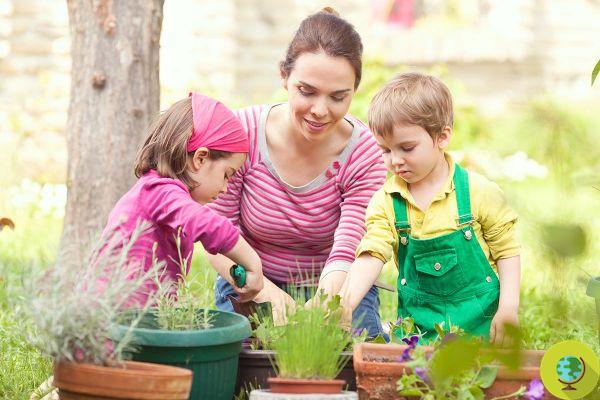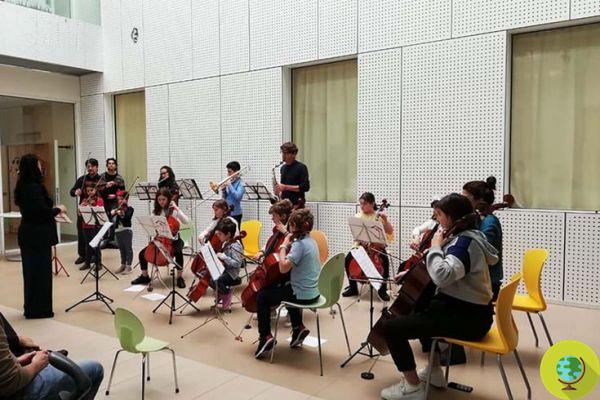
Gardening expert Kier Holmes explains why this activity is great for children and what skills and abilities it can develop in the little ones
Gardening is not a simple hobby but, as many studies have shown, it can turn into a real wellness therapy and this is also true for children. By taking care of the plants, the little ones can learn important skills such as patience and kindness but also work on their self-esteem.
A few years ago research studied the impact of gardening on children, discovering numerous benefits, including the power to keep them healthy. But that's not all, taking care of plants is also good for children because it helps them develop some important skills and values.
Gardening is good for children's health, the study confirms this
But how to transmit the passion for gardening to the little ones? There landscape designer and gardening expert, Kier Holmes, in an article on National Geographic he suggests how to involve the little ones in the care of plants and makes us discover all the advantages of this activity.
First of all, gardening is a tool that teaches real subjects such as mathematics and science but is able to provide the youngest (and not only) even life lessons, stimulating the growth of important values such as kindness, patience and responsibility.
Index
Patience
Taking care of plants teaches you to know how to wait, in fact nature has its own times and you can only have patience to see the fruits of the work done with the earth. The most beautiful flowers and ripe fruit only arrive at the end of the growing season of each individual plant and therefore there is nothing to do but wait.
Patience is a very useful gift that will help the little ones to cope better, and with due calm, even difficult situations and will favor their academic performance (even to learn, in fact, you must take time and not be in a hurry).
How to cultivate this gift: Kier Holmes advises us to gradually introduce children to the art of patience starting from faster crops such as sunflowers (it takes 7-10 days to sprout them) or rocket (in 5-7 days it is ready to eat). Only later, slowly, you can move on to the care of plants that require more time and patience to see the fruits of their work. In this case, children can also keep a gardening diary to document the various stages of growth of their plants with the help of words, drawings or photos.
Self Consciousness
A skill that we often underestimate is awareness, which instead many studies have shown to be useful in relieving stress. Being "here and now", with the awareness of seeing and understanding what happens in that particular moment, explains child therapist Jennifer Couture of Kentfield, "helps to reinforce qualities such as empathy, kindness, gratitude and generosity".
Taking care of plants is an experience that involves all the senses, children can see different colors, perceive smells and sounds and, by focusing on all these aspects together and on the moment they are living, they can develop awareness and calm: they think, observe and they discover "that they have the power to control their greatest feelings and thoughts".
How to cultivate this ability: assign small routine tasks such as watering or digging and stimulate them to experience multiple sensory stimuli.
Kindness
An important gift, not only for having a good relationship with others, but also for a higher academic performance and more likely to have a successful career (according to some studies). Being kind to plants, the earth, and people (including ourselves) helps develop empathy and positive relationships. "It can also help control feelings of anxiety and depression," according to psychologist Christine Curtin.
The garden to survive and grow at its best needs all our kindness and our help, taking care of the plants helps the child to develop a sense of care towards those who need it most.
How to cultivate this gift: stimulate the child to take care of the garden in the most gentle way possible, keeping it healthy for example by cultivating plants that keep insects away, such as thyme and tansy, or releasing ladybugs that have the same purpose.
Reliability
Children who feel responsible are often also the most capable and self-confident children, therefore able to make choices, understand the difference between good and evil and think critically. Taking care of a plant requires constant commitment over time, in fact one has the task of making it grow healthy and strong. A nice exercise of responsibility, in short.
How to cultivate this gift: give the child the opportunity to take care of a single plant or a specific area of your garden independently. He will therefore be solely responsible for what happens in the chosen area. It is also possible to "thematize" his commitment, for example by making him take care of all the aromatic herbs, all the red flowers or other.
Self-esteem
Seeing that, thanks to one's work, flowers and plants grow in the garden is something that is very good for the little ones, contributing to the development of proper self-esteem. However, it may happen that there are failures but this too serves and is part of the life and teachings that each person must treasure.
Children with positive self-esteem are more capable of experiencing new things and also of overcoming setbacks by learning from their mistakes.
How to grow it: to increase the self-esteem of children, you can choose activities for which a quick result is obtained, for example pruning or taking care of a small tree, such as a dwarf lemon, able to be, for a long time, the living example of goal achieved.
All that remains is to pull out the ground, pots and seeds to immediately get to work with your little ones!
Fonte: National Geographic
Read also:
The desire to garden in difficult times has deep and distant roots
Garden Therapy: why it's good for you and 5 ways to practice it at home
10 tips for the vegetable garden and the garden in summer

























